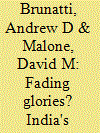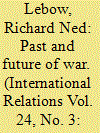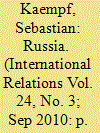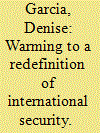|
|
|
Sort Order |
|
|
|
Items / Page
|
|
|
|
|
|
|
| Srl | Item |
| 1 |
ID:
099801


|
|
|
|
|
| Publication |
2010.
|
| Summary/Abstract |
This article examines India's relations with Western Europe and Russia, both regions which have seen their historic influence with India lessened by the rise of the United States and China as Indian foreign policy priorities. The article argues that mutual interests in innovation, defence and energy still drive the relationships, and explores India's continuing preference for bilateralism in its dealings with both regions, particularly Western Europe. The article concludes that, while Indo-European and Indo-Russian relations are currently in a gentle decline and will be influenced by responses to domestic and regional challenges, both relationships still have genuine bilateral interests which will continue to provide the foundation for future initiatives.
|
|
|
|
|
|
|
|
|
|
|
|
|
|
|
|
| 2 |
ID:
099795


|
|
|
|
|
| Publication |
2010.
|
| Summary/Abstract |
An original data set of wars from 1648 to the present indicates that security and material interest are rarely the principal motives for war for rising, great or dominant powers. These states far more often go to war for reasons of standing. The empirical evidence offers no support for power transition, balance of power, Marxist or rationalist theories of war. The frequency of war between and among rising, great and dominant powers is likely to decline precipitously because the most important motives for war in the past - standing, security, revenge, material interests and domestic politics - are, for the most part, no longer served effectively by war. Changes in ideas, not changes in material conditions, are primarily responsible for this transformation.
|
|
|
|
|
|
|
|
|
|
|
|
|
|
|
|
| 3 |
ID:
099798


|
|
|
|
|
| Publication |
2010.
|
| Summary/Abstract |
From 1945 to 1949 the USA was the world's only nuclear power. Although the nuclear arsenal was overestimated both in terms of size and readiness by the US military in its war plans, atom bombs came to be seen as the essential counter to conventional Soviet forces. The USSR constructed its own bombs in turn, and for decades the analysis of nuclear deterrence was almost exclusively concerned with the two superpowers. In the twenty-first century, the nuclear world no longer displays that mirror-image symmetry and can now be viewed as unipolar, regional, multipolar or stateless. Nuclear deterrence that seemed such an established technical reality during the Cold War should be recognized as a psychological construct that depends on threat perception and cultural attitudes, as well as the values, rationality and strength of political leaders who themselves have to mediate between groups with vested economic or military interests. As the number of nuclear weapons states increases, the logic of nuclear deterrence becomes less obvious and it should not be casually invoked as a general security factor without regard to a specific context. Nuclear weapons have become emblems of geopolitical power under the guise of deterrence. We argue that nuclear deterrence is meaningless against extremist terrorists. Our survey of its quirks leads us to believe that nuclear deterrence is a far less foolproof and reliable global security mechanism than many assume.
|
|
|
|
|
|
|
|
|
|
|
|
|
|
|
|
| 4 |
ID:
099800


|
|
|
|
|
| Publication |
2010.
|
| Summary/Abstract |
Outlining the century-old debates about 'What is Russia?', this article - by drawing on a variety of sources such as fiction, culture, cartoons and identity - shows how Russian and Western answers to this question have impacted on each other. To do so, the article first examines the extent to which Russian society - ever since the Mongolian Yoke - has been culturally torn between Westerniser and anti-Westerniser positions. It then complements the insights into Russia's self-reflective identity formation in two ways: by illustrating how Russia, in the West, has become portrayed as a caricature of the Western consciousness and by demonstrating how the Russian 'Self', in return, has been defined through the prism of Western expectations.
|
|
|
|
|
|
|
|
|
|
|
|
|
|
|
|
| 5 |
ID:
099796


|
|
|
|
|
| Publication |
2010.
|
| Summary/Abstract |
The fundamental idea of this article is that the enormity and nature of the challenges created by climate change are redefining the understanding and definition of international security. The threats posed by climate change have become considered security threats, especially since 2007. I also argue that an international norm concerning climate change started emerging and became consolidated around the same time. The norm building process occurred due to three elements: a basic international legal regime, constituted since the 1992 United Nations Framework Convention on Climate Change (UNFCCC), its 1997 Kyoto Protocol (followed by ratification by the majority of states), and the 2009 political framework set out by the Copenhagen Accord. All this was guided by authoritative scientific evidence throughout. The consolidation of an international norm concerning climate change demonstrates that norm internalization processes in treaties do not automatically result in successful norm crystallization. It took a dramatic shift of position in the domestic arena in the United States and other recalcitrant states for the international norm to consolidate. This shift of mood was multilayered: i.e. it included the participation of many actors in society, especially local and state governments, as well as the private sector. Most importantly, the security aspects of climate change became known and this dimension of the debate gained enormous prominence.
|
|
|
|
|
|
|
|
|
|
|
|
|
|
|
|
|
|
|
|
|